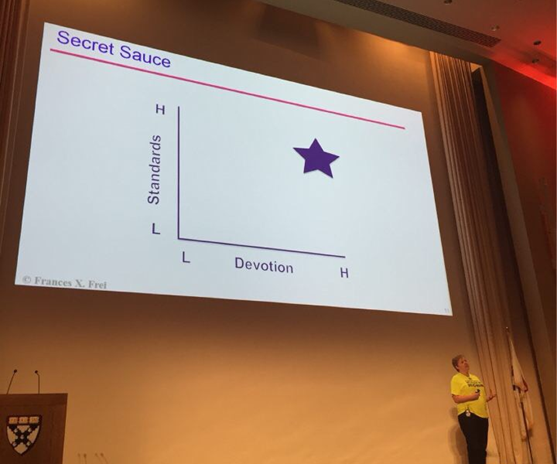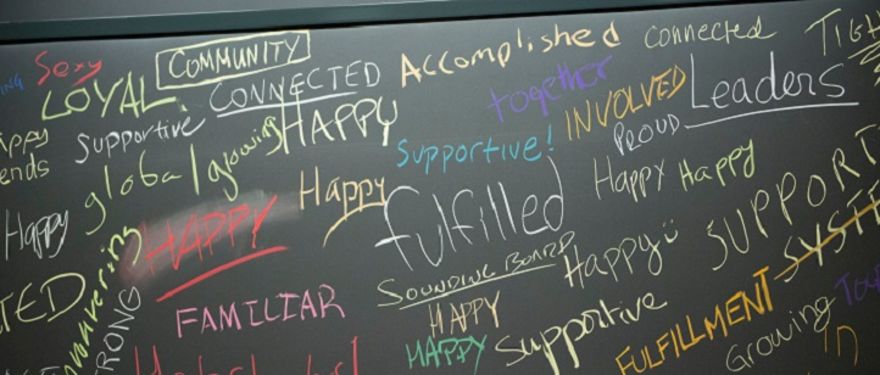I'm not going to lie, I began Bridges feeling pretty grumpy. I was running late, I hadn't eaten breakfast, and I absolutely positively did not want to reflect. Big questions about my identity, values, and life after HBS? I'd have plenty of time for that once I'd finished my exams, written my final paper, found a place to live, and gotten to the bottom of my overflowing inbox.
Right?
But that's the thing about life, I realized over the next three days: it's never the right time. There's always more work to do, another email to send, the unexpected curveball upsetting your plans. You can spend years under this spell – working hard to stay afloat with only the faintest memory of where it is you're actually trying to go.
Staying on top of it all is hard work. But what takes even more strength is taking a step back.
Here is some of what Bridges helped me remember.
There is no excellence without kindness
There are two true things about HBS students: we are relentless in our pursuit of quality, and we are well past the arena of individual achievement. We want to make things the very best they can be – the best slide deck, the best idea, the best business outcome – and we no longer rely on just ourselves to do it. We know the secret: if you really want to make an impact, you need help.
This presents all kinds of problems, however. Just try to convince someone to do something they don’t feel like doing, and you can quickly come to the conclusion that you’re just running into a brick wall. So what do you do? Do you cling to your insanely high standards? Or do you try to empathize with the human being on the other side of the table?
The answer is yes.
I've seen a lot of 2x2 matrices in my time at HBS, but Frances Frei's is my favorite:

This is the trick for getting the best out of people – a clear-eyed, completely objective understanding of what it takes to succeed, and an unshakeable belief in your people's ability to do it.
But still. It's frustrating. Your employee, boss, colleague, business partner – they're just not budging. Deepak Malhotra, in another one of our Bridges sessions, said something I hope to remember in those moments.
Partner, not opponent.
The person you're trying to persuade isn't against you. it may seem like you’re arguing, but "fight" is such a narrow framing. As he put it, "Your greatest source of leverage is your ability to create value for the other side." In the end, it’s not just about getting the deal you want but about helping the other side – your partner – sell it to their own constituents.
So empathize. Be kind. See the world through gentler eyes.
This is not instinctive behavior. "Human nature," Professor Frei said of her matrix, "runs on the opposite diagonal." But that's why being great isn't as simple as having the right answer and telling everyone about it. You don't get there without devotion to the people around you and the creativity, intelligence, and humility to be kind.
Making a difference isn't a one-time event. It's a way of life.
Before I came to HBS, I used to think a lot about broad impact. I want to create the next iPhone, build the next conglomerate. Touch millions of lives and leave my name in stone.
These days, I think more about deep impact. I think of the friend who, four years ago, took the time to teach me about exercise and nutrition when I decided I wanted to lose weight. He created a workout plan and told me to text him every day to tell him if I had done it. Two minutes a day, and he changed my life.
Making a difference is not something you do once. It is a way of being. It is that person who shows up and cares, even if no one else does. Who sees something wrong and leaps on the opportunity to improve it. Who smiles and lifts the mood of a room. Who refuses to see the other side as “the enemy.” Who shows others the better people they can be.
That is the difference that I will make – every moment, every day.
And you will know that I was here.
So thank you, Kristin, Scott, and Steve, for making us pause. For creating a space during Bridges where we could reflect on our goals, recommit to our values, and reconnect with each other. Because you can't do it alone. You need friends, advisers, and a community in your life to help you step away from the what and help you remember the why. For a business school, we spend an awful lot of time talking about life and how we want to live it – and I'm so glad we do.

